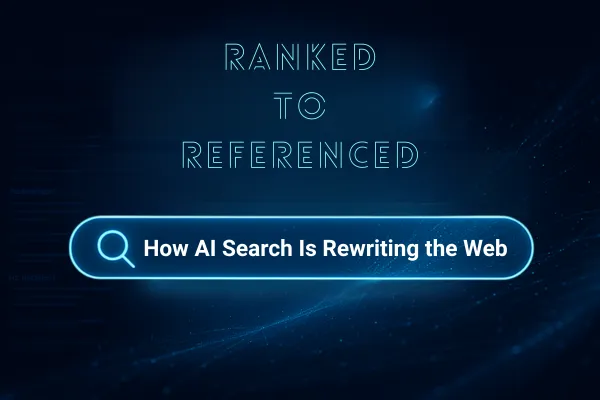Sales Engines That Capture Every Call

How AI Search Is Rewriting the Web
If you’ve noticed your website traffic dip lately, you’re not imagining it.
Search itself is changing — and fast.
For more than two decades, the game was simple: rank high on Google, win the click, capture the lead. But that world is giving way to something entirely new.
AI search — powered by systems like Google’s AI Overviews, OpenAI’s ChatGPT Search, and Perplexity — isn’t just changing how people find answers. It’s changing where those answers live and how brands earn visibility.
We’re moving from a world of rankings to one of references.
And that shift is rewriting the rules for every website owner.
Neil Patel and the New SEO Frontier
Neil Patel saw this coming before most people did.
As co-founder of NP Digital and creator of Ubersuggest, he’s always chased what’s next in visibility. Today, Patel’s message is clear: if you want to be found, you have to show up inside the answers AI provides — not just beneath them.
He calls it AI Search Optimization, and his agency now helps brands earn citations and mentions within generative results.
In other words, you’re not just trying to rank — you’re trying to be quoted.
Even Ubersuggest is evolving to track how often brands appear inside AI summaries. That tells you where the puck is heading.
Why the Old Playbook Doesn’t Work Anymore
Let’s be real — most websites were built for a different era.
Here’s what’s changed:
Clicks are disappearing.
When Google’s AI Overview shows up, clicks drop. Studies suggest a 25–45% decline for affected searches. The AI box answers the question right there on the page.New AI engines are real traffic channels.
ChatGPT’s Search feature and Perplexity’s rapid growth (hundreds of millions of monthly visits) have turned them into legitimate discovery tools. These engines cite sources, but only if your content is structured to earn that trust.Ranking isn’t enough.
The new skillset — often called AEO (Answer Engine Optimization) or GEO (Generative Engine Optimization) — focuses on clarity, credibility, and structure that invite citations.
How Website Strategy Is Changing
1. Design for Citations, Not Just Rankings
Make your pages easy for both humans and machines to quote.
Use short, clear paragraphs with a TL;DR summary up top.
Add FAQ schema and How-To sections that define steps or concepts cleanly.
When we applied this format for a client last quarter, Perplexity cited their guide within three weeks.
That’s the new metric of success.
2. Strengthen Entity and Trust Signals
AI engines don’t trust because they like your writing style.
They trust because the web backs you up.
Make sure your business name, address, and contact details are consistent everywhere. Link author bios to real profiles. Seek press mentions and interviews that reinforce your expertise.
This cross-domain consistency tells AI models, “Yes — this source is real.”
3. Target “Answer-Dependent” Queries
Generic questions are increasingly self-contained in AI.
So lean into specific, local, or proprietary content:
pricing by region, internal data, real-world comparisons.
That’s where the AIs still have to click through — and where you can win.
4. Publish for AI Channels Directly
Perplexity isn’t the enemy; it’s another front page.
Make sure your site allows its crawler. Write sentences that could stand alone as quotable insights.
Track when your brand is referenced — tools like Ubersuggest are beginning to show this.
5. Measure the Right Metrics
Traffic alone won’t tell the full story anymore.
Start tracking:
Mentions in AI answers
Citation count across AI engines
Conversions from those citations
You might see fewer clicks overall, but higher-intent leads.
Quality beats quantity now.
Building Websites for the AI Era
Modern sites have to do more than look good — they have to communicate clearly to algorithms.
Here’s what matters most:
Structured data. Tag FAQs, products, and services with schema markup.
Scannable sections. Two-to-three line paragraphs help both readers and machines.
Author pages. Include credentials and social links — proof you’re a real person.
Freshness. Update your best content quarterly. AI systems favor recency.
Answer blocks. Drop short, definitive paragraphs that could stand as citations on their own.
What the Future Looks Like
The web isn’t dying; it’s just becoming more distributed.
Instead of one search engine, we’ll have dozens of AI systems summarizing the world’s information in real time.
That means visibility will belong to those who earn trust — not those who play keyword games.
Neil Patel summed it up perfectly:
“You have to optimize for the machines that summarize the web.”
Imagine opening ChatGPT or Perplexity and seeing your brand name appear inside the answer box.
That’s the new front page of Google.
And that’s what we’re building toward.
In Short
Traditional SEO chased rankings.
Modern SEO earns citations.
The winners will be the brands that speak clearly, structure smartly, and build digital trust.
If you’re tired of juggling tools, calls, and follow-ups — imagine having one system that brings your leads, reviews, and AI visibility together in one place.
That’s the transformation waiting on the other side of this shift.
Want more insights like this? Follow us on Facebook or visit LeadX22.com for new articles each week.
© 2026 LeadX22 | All Rights Reserved


Facebook
Instagram
LinkedIn
Youtube